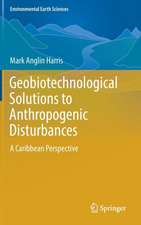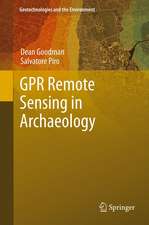SYNER-G: Typology Definition and Fragility Functions for Physical Elements at Seismic Risk: Buildings, Lifelines, Transportation Networks and Critical Facilities: Geotechnical, Geological and Earthquake Engineering, cartea 27
Editat de K. Pitilakis, H. Crowley, A.M. Kayniaen Limba Engleză Hardback – 29 ian 2014
A fragility function manager tool and fragility functions in electronic form are provided on extras.springer.com.
Audience
The book aims to be a standard reference on the fragility functions to be used for the seismic vulnerability and probabilistic risk assessment of the most important elements at risk. It is of particular interest to earthquake engineers, scientists and researchers working in the field of earthquake risk assessment, as well as the insurance industry, civil protection and emergency management agencies.
| Toate formatele și edițiile | Preț | Express |
|---|---|---|
| Paperback (1) | 571.42 lei 38-45 zile | |
| SPRINGER NETHERLANDS – 30 apr 2017 | 571.42 lei 38-45 zile | |
| Hardback (1) | 653.79 lei 6-8 săpt. | |
| SPRINGER NETHERLANDS – 29 ian 2014 | 653.79 lei 6-8 săpt. |
Din seria Geotechnical, Geological and Earthquake Engineering
- 15%
 Preț: 665.73 lei
Preț: 665.73 lei - 18%
 Preț: 1405.90 lei
Preț: 1405.90 lei - 15%
 Preț: 717.59 lei
Preț: 717.59 lei - 18%
 Preț: 959.19 lei
Preț: 959.19 lei - 15%
 Preț: 656.43 lei
Preț: 656.43 lei - 18%
 Preț: 1944.11 lei
Preț: 1944.11 lei -
 Preț: 392.60 lei
Preț: 392.60 lei - 18%
 Preț: 954.62 lei
Preț: 954.62 lei - 18%
 Preț: 954.45 lei
Preț: 954.45 lei - 15%
 Preț: 638.24 lei
Preț: 638.24 lei - 18%
 Preț: 954.45 lei
Preț: 954.45 lei - 15%
 Preț: 640.24 lei
Preț: 640.24 lei - 20%
 Preț: 572.65 lei
Preț: 572.65 lei - 24%
 Preț: 805.40 lei
Preț: 805.40 lei - 20%
 Preț: 602.78 lei
Preț: 602.78 lei - 15%
 Preț: 639.08 lei
Preț: 639.08 lei - 18%
 Preț: 1242.83 lei
Preț: 1242.83 lei - 15%
 Preț: 639.73 lei
Preț: 639.73 lei - 15%
 Preț: 637.46 lei
Preț: 637.46 lei - 18%
 Preț: 1222.01 lei
Preț: 1222.01 lei - 18%
 Preț: 967.08 lei
Preț: 967.08 lei - 18%
 Preț: 959.98 lei
Preț: 959.98 lei - 15%
 Preț: 658.88 lei
Preț: 658.88 lei - 18%
 Preț: 969.44 lei
Preț: 969.44 lei - 15%
 Preț: 657.73 lei
Preț: 657.73 lei - 18%
 Preț: 961.55 lei
Preț: 961.55 lei - 15%
 Preț: 652.49 lei
Preț: 652.49 lei - 18%
 Preț: 961.86 lei
Preț: 961.86 lei - 15%
 Preț: 649.06 lei
Preț: 649.06 lei -
 Preț: 450.02 lei
Preț: 450.02 lei - 18%
 Preț: 967.22 lei
Preț: 967.22 lei - 18%
 Preț: 1117.99 lei
Preț: 1117.99 lei - 15%
 Preț: 656.58 lei
Preț: 656.58 lei
Preț: 653.79 lei
Preț vechi: 769.17 lei
-15% Nou
Puncte Express: 981
Preț estimativ în valută:
125.11€ • 133.78$ • 104.31£
125.11€ • 133.78$ • 104.31£
Carte tipărită la comandă
Livrare economică 18 aprilie-02 mai
Preluare comenzi: 021 569.72.76
Specificații
ISBN-13: 9789400778719
ISBN-10: 9400778716
Pagini: 440
Ilustrații: XVII, 420 p. 171 illus., 72 illus. in color. With online files/update.
Dimensiuni: 155 x 235 x 25 mm
Greutate: 0.79 kg
Ediția:2014
Editura: SPRINGER NETHERLANDS
Colecția Springer
Seria Geotechnical, Geological and Earthquake Engineering
Locul publicării:Dordrecht, Netherlands
ISBN-10: 9400778716
Pagini: 440
Ilustrații: XVII, 420 p. 171 illus., 72 illus. in color. With online files/update.
Dimensiuni: 155 x 235 x 25 mm
Greutate: 0.79 kg
Ediția:2014
Editura: SPRINGER NETHERLANDS
Colecția Springer
Seria Geotechnical, Geological and Earthquake Engineering
Locul publicării:Dordrecht, Netherlands
Public țintă
ResearchCuprins
Preface.- 1 Introduction.- 2 Modeling and Propagation of Uncertainties.- 3 Evaluation of Existing Fragility Curves.- 4 Epistemic Uncertainty in Fragility Functions for European RC Buildings.- 5 Fragility Functions of Masonry Buildings.- 6 Fragility Functions of Electric Power Stations.- 7 Fragility Functions of Gas and Oil Networks.- 8 Fragility Functions of Water and Waste-Water Systems.- 9 Fragility Functions of Road and Railway Bridges.- 10 Fragility Functions of Highway and Railway Infrastructure.- 11 Fragility Functions of Harbor Elements.- 12 Component Fragilities and System Performance of Health Care Facilities.- 13 Fragility Function Manager Tool.- 14 Recommendations for Future Directions in Fragility Function Research.- Index.
Textul de pe ultima copertă
Fragility functions constitute an emerging tool for the probabilistic seismic risk assessment of buildings, infrastructures and lifeline systems. The work presented in this book is a partial product of a European Union funded research project SYNER-G (FP7 Theme 6: Environment) where existing knowledge has been reviewed in order to extract the most appropriate fragility functions for the vulnerability analysis and loss estimation of the majority of structures and civil works exposed to earthquake hazard. Results of other relevant European projects and international initiatives are also incorporated in the book. In several cases new fragility and vulnerability functions have been developed in order to better represent the specific characteristics of European elements at risk. Several European and non-European institutes and Universities collaborated efficiently to capitalize upon existing knowledge. State-of-the-art methods are described, existing fragility curves are reviewed and, where necessary, new ones are proposed for buildings, lifelines, transportation infrastructures as well as for utilities and critical facilities. Taxonomy and typology definitions are synthesized and the treatment of related uncertainties is discussed.
A fragility function manager tool and fragility functions in electronic form are provided on extras.springer.com.
Audience
The book aims to be a standard reference on the fragility functions to be used for the seismic vulnerability and probabilistic risk assessment of the most important elements at risk. It is of particular interest to earthquake engineers, scientists and researchers working in the field of earthquake risk assessment, as well as the insurance industry, civil protection and emergency management agencies.
A fragility function manager tool and fragility functions in electronic form are provided on extras.springer.com.
Audience
The book aims to be a standard reference on the fragility functions to be used for the seismic vulnerability and probabilistic risk assessment of the most important elements at risk. It is of particular interest to earthquake engineers, scientists and researchers working in the field of earthquake risk assessment, as well as the insurance industry, civil protection and emergency management agencies.
Caracteristici
Collection and review of fragility curves for buildings, lifelines, infrastructures, critical facilities Typology/damage states for buildings, lifelines, infrastructures, critical facilities Fragility function manager and fragility functions for all elements Includes supplementary material: sn.pub/extras



























